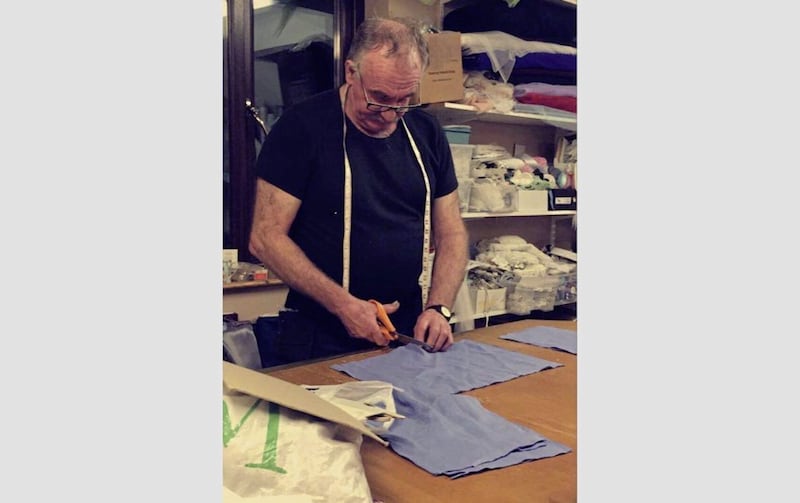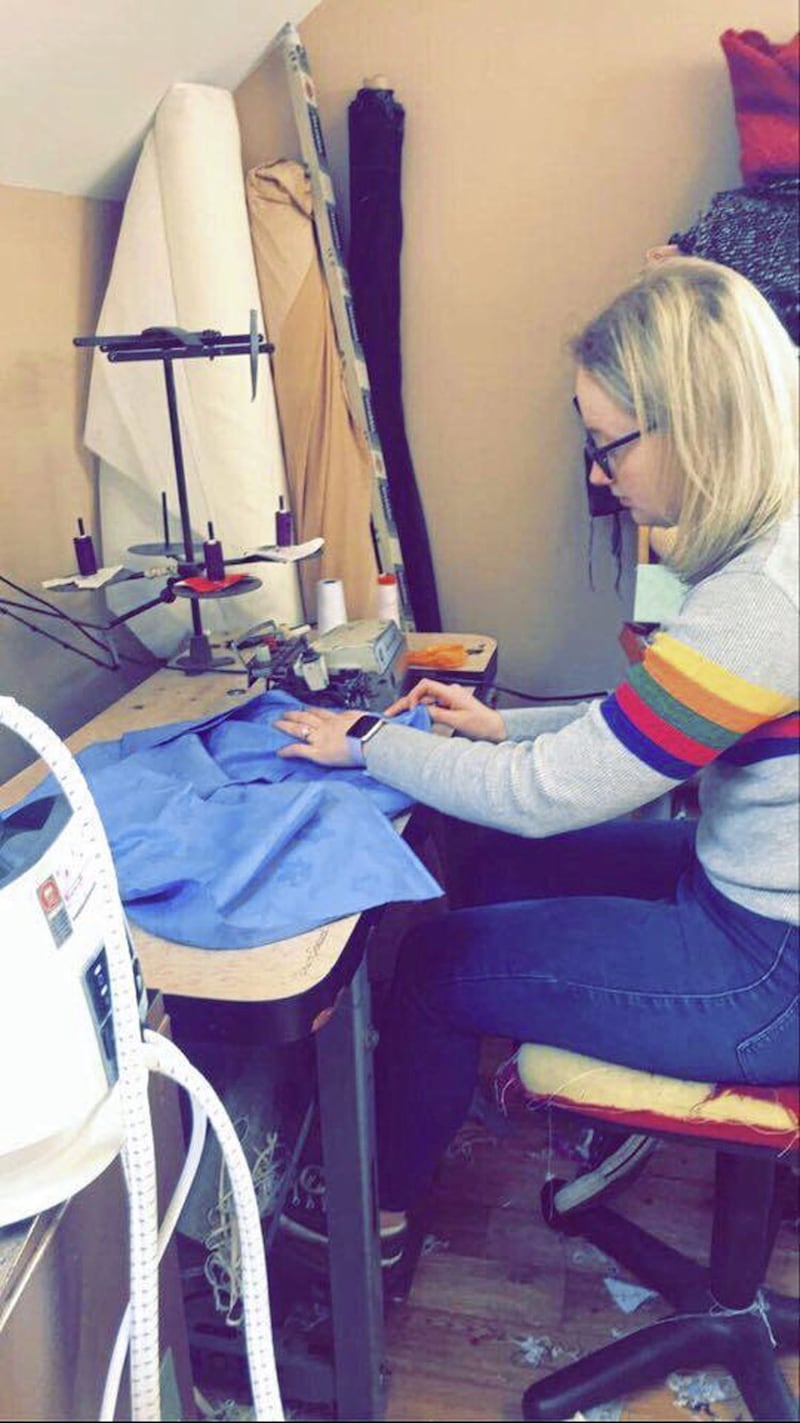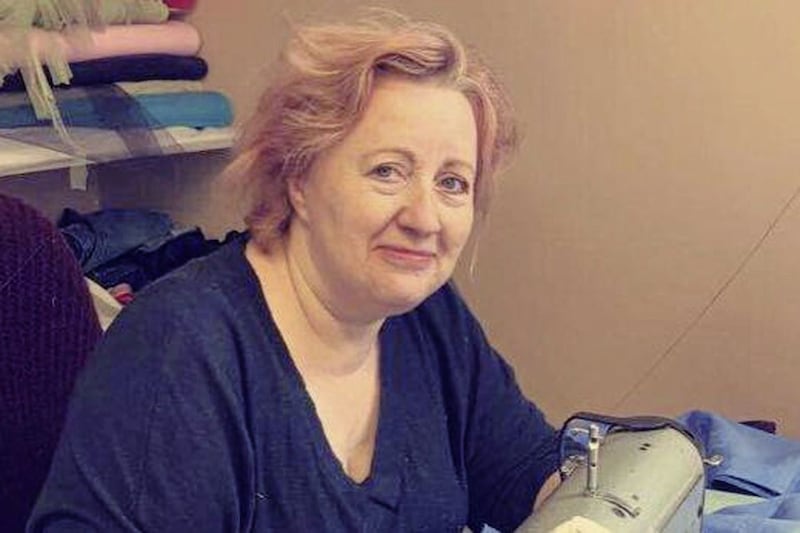SILK and lace are her usual tools of the trade, but wedding dress designer, Shirley Moorhead has swapped work on luxurious veils and trains to go back to basics: making scrubs and masks for hard-pushed nursing home staff in Co Down.
Wedding fittings may be off for now but the talented designer and dressmaker behind Fairytale Designs near Castlewellan is still putting in 12-hour days: this time, cutting cotton and turning out much-needed scrubs for NHS nurses and those working in local nursing homes who have also been in need of masks during the Covid-19 crisis.
She answered the call for help after being contacted by a former customer and, to help get orders out the door, has now enlisted the help of her engineer husband Joe and daughter Johanna – whose own wedding dress has been put on hold to deal with the emergency orders.
A mother-of-five and grandmother to three young boys, Shirley has been working long hours and making masks and scrubs for free – with material generously donated through several local churches in the rural Ballyward and Clonduff areas near her home.
It has been an exhausting schedule and she doesn’t get to see the joyful smiles of her brides at the end of it all, but it has been a true labour of love for the designer-maker, who is usually flat-out in her workshop, making brides their dream wedding dress at this time of year.
“It’s been a real community effort and everyone has been so generous in donating material,” she says during a rare break away from the scissors and sewing machine. “I’ve been glad to do what I can to help.

“I started a few weeks ago after a girl I’d been making different occasion dresses for over the last few years got in touch to say her sister was running a nursing home and they had no masks and were starting to get a bit afraid.
“It was just after lockdown was announced and we were all wondering what on Earth was happening… I started with around 350 masks and they seemed delighted to have some sort of protection for themselves and residents.
“Certainly, it’s been a whole new learning curve for me, but we’re just been getting on with it while weddings are cancelled and brides can’t come for fittings. I sent another 50 masks away yesterday and I would say I’ve probably done upwards of a thousand masks to date, mostly for nursing homes in the area.”
There is some debate on the type of mask that should be used outside a hospital setting, but from reading up on the latest scientific advice available and using her own long experience of the properties of different types of fabrics, Shirley has been making three-layer cotton masks with a non-woven layer of interfacing sandwiched in between.
“Going by the latest scientific evidence, a three-layer cotton mask with the non-woven interfacing in the middle of it, won’t be as effective as a medical-grade mask, but it is recommended because it is easier to breathe through,” she explains.
“If you were to take a tea towel and make a double layer with it, that would be equally as effective as a medical grade mask, but it would be difficult to breathe through and, for that reason, people wouldn’t keep it on. They would be more inclined to lift it up and that’s where the problem lies – touching the mask and then touching your face.

“Thankfully, I have a fair wee mountain of fabric at the moment, so I don’t need any more at present. With regards to the pattern, there are guidelines, and I make my own within those guidelines. I haven't had to go and source a pattern.”
Only medical grade masks are accepted in hospitals, but these cotton masks have been helping bridge a widening gap in social care and nursing home settings.
“I’ve heard people have been delighted and feedback has been positive, which is great,” says Shirley, who has also been approached to make scrubs for a number of nurses and their friends and colleagues working in the wards on NHS hospitals.
So far, several sets of her scrubs have been accepted at the new GP-lead NHS Covid-19 centre in Banbridge and she is currently working on an order for 120 sets to be finished this week for two local nursing homes.
Helping with this order is Shirley’s daughter, Johanna, who is due to get married next May, with her twin sister, Abigail, planning to tie the knot with her fiancée in November this year.
Unsurprisingly, both she and her twin both want their wedding dresses made by their mum who is in demand by brides across Northern Ireland, usually coping with more than 100 orders annually for wedding dresses, bridesmaid, mother-of-the-bride and mother-of-the groom outfits.
Currently, with so many weddings cancelled over the next few months, Shirley knows there is “a mountain” waiting to be climbed, the other side of coronavirus.
“My July weddings are still hoping to go ahead,” she says, “but, anything up until July has now been postponed. That means September and October will be really busy, so I know, in my heart, that I need to be working on Abigail’s dress now, but she has been working in a nursing home and hasn’t been home. Luckily, the design is already done and I can always do fittings on her twin sister, as both girls are the same size.”
After leaving school at 16, Shirley worked in a bank for 12 years before leaving to start up her own business making maternity wear which was sold across Northern Ireland, later opening her own shop in Rathfriland and franchising the ‘Fairlytale’ name to several other outlets.
She was gradually drawn towards bridal wear, and after having her third child, moved home and grew the business from there. But despite the pressure, it’s a job she loves, even if it does come with a mix of drama, at times.
“The best bit, for me, is seeing the joy on the faces of the brides and mothers in the photographs afterwards – I really love seeing the dresses worn by the brides on their big day,” she says. “The worst bit? When you’re half-way through making a dress and somebody turns up for a fitting having lost three stone or something – the weight-changing is the most stressful thing because the dress to fit perfectly on the day.
Switching mindset from bridal to scrubs and masks has been challenging and sometimes she wonders why she just didn’t sit down and read a book during the unexpected 'bridal’ break.
“On the other hand,” she counters, “I am aware that the work is needed and I feel that, in a small way, it is God’s work, a service for Him. That’s what I feel on a personal basis and it’s also part of my personality – I like to have busy hands. But I have had help – my husband has developed new skills in cutting, pressing and overlocking, for instance, so it’s been a family effort. He and Johanna haven’t had much choice, to be honest.”


